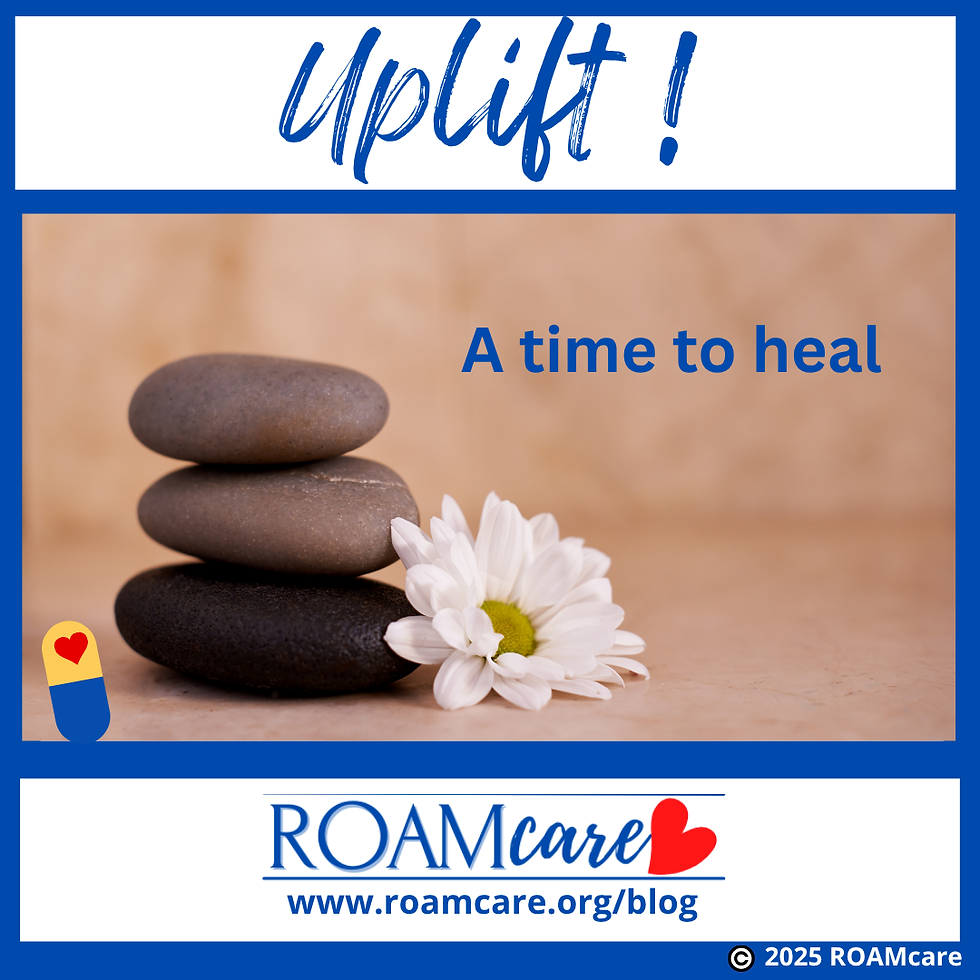Get your rests
- roamcare
- Sep 11, 2024
- 3 min read
“I feel like I sleep walked through the day. Being a couch potato isn’t so bad.” Diem didn’t put a question mark at the end of that but Michael, a part-time potato himself, treated it as if she had, and responded, “No, being a couch potato is good way to recharge.” Truthfully, we aren’t sure that it is an ideal recharging method. We do know, however, any down time renews energy needed for all the up times.
Rest is a state most people find hard to come by. No matter how many breaks throughout the day or how uninterrupted a night’s sleep might be, so often it never seems to be enough to feel truly well rested.
Lifestyle and leadership writer George Stern proposes we need seven kinds of rest to be rested. Stern’s seven rests are physical, mental, emotional, spiritual, social, sensory, and creative. We agree to a point. While we see the need to rest our bodies and minds and with them our emotions, and senses, we feel it’s to our benefit to increase spiritual, social, and creative endeavors.
We can most often combine physical, mental, emotional, and sensory needed rests in a single quality rest target. Trying to separate the four is like trying to unbraid a rope. You end up with 4 strings but together they are stronger than any of the four alone. What affects one, affects all. Both ways. An emotional burden leads to mental distress leads to disquieting sensory stimuli leads to inadequate physical rest. A quality mental state will lessen emotional distress leading to less sensory overload leading to better physical rest.
Certainly there are times when nights are shorter than they should be. An evening extends into the later hours, or a meeting or appointment calls for an earlier wake up time. In most cases on most days though, the time between falling asleep and waking up is sufficient. It is the quality that may not always be as satisfactory as the quantity.
When quantity is insufficient, usually a simple reset of the routine puts sleep back in order. That adjustment starts when you wake up. Upon waking, seek the sun! The effect of sunlight on the human brain is measurable in the release of serotonin which energizers a person, and in the schedule of the release of melatonin some twelve hours later which then calms the brain and readies it for sleep. After several day, this will become the default sleep pattern.
Much more often, inadequate rest after a night’s sleep is due to trying mental, emotional, or sensory stimuli. We are not mental health professionals and we cannot make recommendations for those experiencing traumatic, emotional upheaval or breaks in mental health. Serious concerns affecting one’s total well-being need the specialized touch of qualified professionals. As far as the everyday thoughts of “did I do good today,” “I worked so hard my brain is tired,” or “oh he really got me angry” are concerned, those are often easier to control and push into the shadows than you would imagine. Mental imagery, meditation, prayer, and creating a suitably restful environment are tools we all can master.
Sleep sounds can do more than help you sleep. According to the National Sleep Foundation, devices and phone apps can help you create a calming and sleep-friendly environment and may strengthen rest by reducing external noises. The most well know of these sounds is white noise often likened to auditory static which some say can promote sleep.
White isn’t the only noise “color.” Pink noise is lower pitched than white noise and has been describe as like the wind or a waterfall. It has been linked to improved cognitive performance. Brown noise, also known as red noise, is even deeper than pink noise and may compare to rainfall or to thunder. It has been linked to lessening of the ringing in the ears by susceptible individuals. Green noise amplifies the middle frequencies of the sound spectrum and has been described as a waterfall or an ocean wave sound. Green noise best masks noisy environments.
These sounds in their own ways lessen a person’s sensory load, relaxing and quieting the mind so the brain can rest. As the brain rests, emotions calm and physical relaxation is noted so a person can work, rest, or sleep better.
Clearing mental clutter, quieting emotions, and lessening the load we subject our senses to are hallmark recommendations to getting more sleep. They also are ideal steps to take to getting more rest. When you want to improve your daytime functioning, start treating it like your nighttime. Get your rests. All of them.





Rereading this reminds me again that rest, and not continued activity is best for us. God made us finite, not constant-motion machines. The demands we put on ourselves are often unrealistic. And when you break rest into those seven categories, it becomes clear that we all need to take a step back, breathe, and rest all parts of us. The timing of this is wonderful, you two.
I'm so glad the two of you decided to address this. I heard a seminar on the seven types of rest, and I tend to agree with you. The four you mention are interconnected. I also think folks today can easily ignore what their bodies are telling them and will push through, to their (our) own detriment. Rest isn't a welcomed concept in a culture where production and doing is held as higher than being. Bringing this topic up serves to remind us that we are more than what we do, we're not unlimited, and we need rest. Well said.